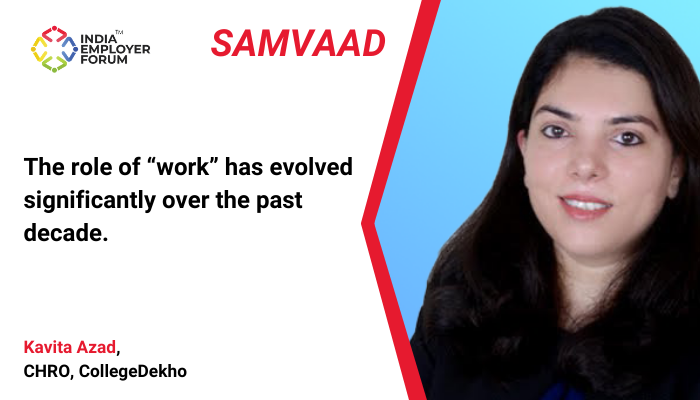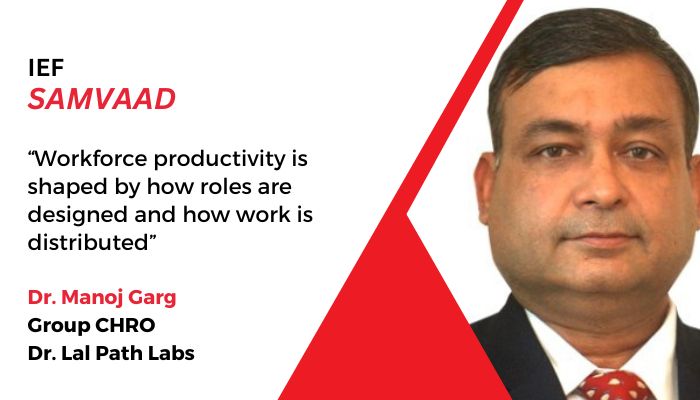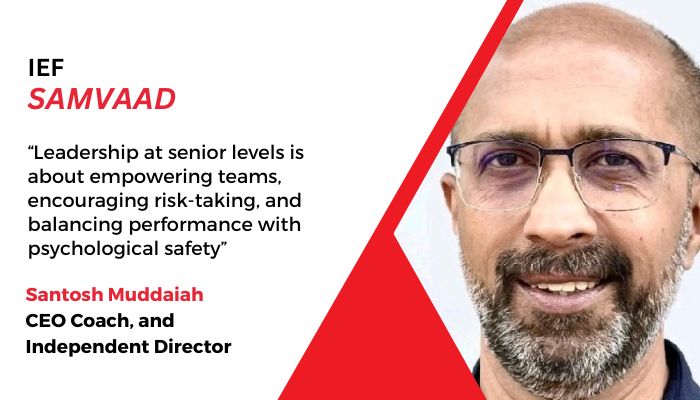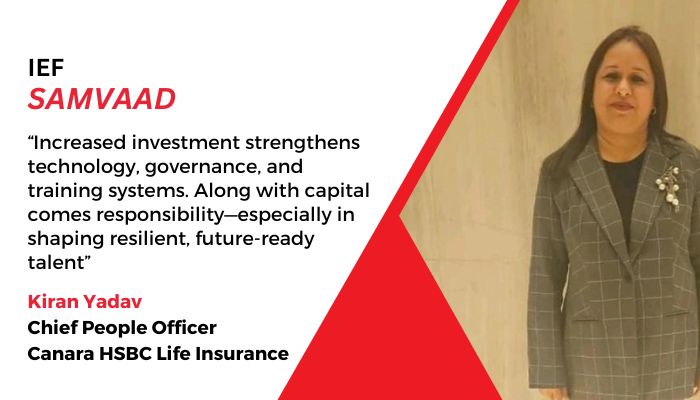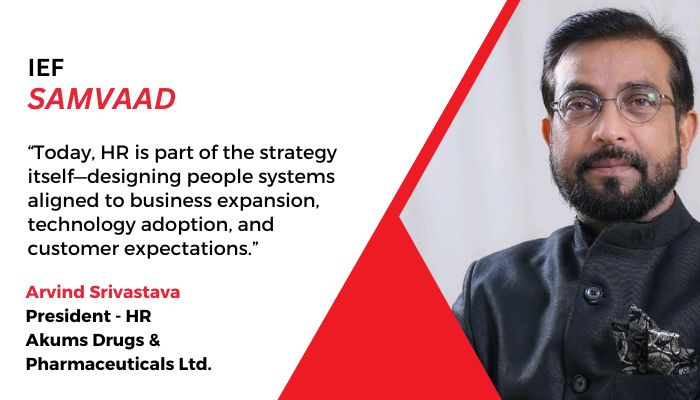Kavita Azad, Chief Human Resource Officer, CollegeDekho,
speaks to India Employer Forum about career in human resources,
crafting talent strategies across diverse industries, contributing to organizational success and growth, etc.
Q. Please tell us a little bit about your professional journey focusing on what you would describe as the key highlights in your career.
I have over 22 years of diverse and extensive career in human resources, spanning various industries such as Financial Services, Consulting, Telecom, IT/ITES, and eCommerce with companies like Bharti, Convergys, American Express, British Telecom, eClerx and CollegeDekho providing a broad exposure to different corporate cultures and companies across different lifecycle stages and challenges.
It allowed me to play a pivotal role in crafting talent strategies across diverse industries, contributing to organizational success and growth. Serving as a strategic advisor to business leaders, providing insights and guidance on various HR matters crucial to business performance. Led initiatives related to organization design and effectiveness, optimizing structures to enhance agility and performance. Implemented initiatives to enhance employee experience, fostering a positive work culture and improving engagement. Spearheaded programs focused on leadership development and capability building, nurturing talent pipelines and ensuring leadership readiness. Have been instrumental in driving business growth through successful talent strategies, positively impacting employee engagement and overall performance and building great place-to-work organizations.
Also, got an incredible opportunity as a co-founder to make a meaningful difference! Empowering marginalized street food vendors through digital inclusion can have a significant impact on their lives by providing them with access to new markets, financial tools, and resources that can help them grow their businesses and improve their livelihoods.
Q. Has the role of “work” in an individual’s life changed from what it was a decade ago? If yes, how are companies coping with this?
The role of “work” has evolved significantly over the past decade. This is attributed to advancements in technology, cultural and social changes, changing demographics and workforce preferences, globalization, economic and geopolitical factors and changes in workplace culture. Several notable changes have occurred by way of the widespread adoption of remote work, employees increasingly seeking jobs that offer flexibility and prioritize their well-being, the rise of the gig economy providing individuals with more opportunities for flexible work arrangements, advances in technology enabling greater collaboration, automation, and efficiency, increased awareness and emphasis on diversity, equity, and inclusion in the workplace over the past decade.
In coping with these changes, companies have adapted their organizational structures, policies, and practices to remain competitive and attract top talent. The definition of work will continuously change and adapt in response to the changes happening outside in the societal ecosystem reflecting in internal changes within organizations and continue expanding to encompass new forms of employment and modes of productivity.
Q. The constant focus on performance leads to faster burnout as well. Is this something that individuals need to manage or can the organization play a role in this?
It’s a two-way deal, where both individuals and organizations have roles to play. In today’s VUCA world, it is increasingly important for employees to actively manage their workload, set boundaries, prioritise tasks, manage stress levels, and well-being by practising self-care techniques, and seek support when needed. Building a balanced performance culture is critical where organizations strive to balance fostering high performance and preventing burnout.
Organizations have a responsibility to create a supportive work environment that prioritizes employee well-being alongside performance. This can include setting realistic goals, providing clear expectations, and offering regular feedback on what is expected of them, implementing policies and practices that promote work-life balance, encouraging a culture of collaboration rather than competition, recognizing and rewarding not only achievements but also efforts and progress, providing resources for mental health support, and professional development, cultivating a culture of open communication, monitoring workload to keep them manageable and realistic, and equipping employees with the training and tools they need to handle pressure effectively.
Q. What do you think people look for in an organization? Is it only money? Does this differ across levels or age groups?
People evaluate a multitude of factors while making employment choices and these preferences can vary depending on individual circumstances, personal priorities job levels and age groups.
Entry-level employees may prioritize opportunities for learning and growth, as well as a supportive work environment. Mid-career professionals might place greater emphasis on salary, benefits, leadership and opportunities for advancement. Experienced professionals may prioritize work-life balance, job security, and alignment with the company’s values and mission.
Lifetime employment is something of the past, the younger generation is coming to say do I relate to the bigger picture of the company, how can I make a meaningful impact? They prioritize meaningful roles, work-life balance, and workplace culture with a positive and supportive culture where they feel valued, respected, and included; while job security and stability a crucial considerations for older workers.
Q. What are your thoughts on employee development and leveraging work-based learning programs within the company?
The learning and development definition has evolved over some time, employees increasingly value real work-based learning and organizations track the return on every dollar invested in employee development with a high focus on optimising business impact.
Work-based learning programs provide employees with opportunities to enhance their skills and knowledge relevant to their roles, by increasing overall competency levels and fostering a culture of innovation and adaptability. To the organization, it leads to higher levels of employee engagement and improving retention rates, serving as a platform for succession planning by grooming future leaders from within, facilitating knowledge sharing and cross-functional collaboration by breaking down silos and promoting a culture of teamwork.
Effective employee development programs should be personalized, customizable to meet the unique needs and goals of individual employees, and offered in a variety of learning formats, such as skill workshops, industry expert talks, online bite-sized courses, mentoring, challenging big bet projects, on-the-job training, to choose the mode that best suits their learning styles and schedules.
It’s important to establish clear metrics and evaluation criteria to measure the success of work-based learning programs relating it to business impact through employee performance improvements.
Q. Do you find there has been an increase in co-owned and co-paid learning initiatives among the workforce?
Co-owned initiatives allow employees to have more control over their learning paths and goals choosing courses or programs that align with their real work-based requirements and career aspirations, while employers provide support and resources to facilitate this development. Co-paid enables sharing of the financial burden, drives higher ownership and responsibility in making relevant learning choices and for companies to make learning more accessible to employees while still demonstrating a commitment to their development and enhancing employee retention and loyalty. This trend is likely to continue as both employers and employees are actively invested in the learning process through this model supporting relevant learning.
About Kavita Azad, Chief Human Resource Officer, CollegeDekho
A seasoned HR leader, with over 22 years of experience spanning multiple industries inclusive of Financial Services, Consulting, Telecom, IT/ ITES, eCommerce, and EdTech. Kavita has led HR for organizations that include Bharti, Convergys, American Express, British Telecom, eClerx, CollegeDekho etc, also been a Co-founder for a Tech eCommerce startup Hokart for a few years.
Disclaimer: The opinions and views expressed in this article, including any accompanying data, are the sole responsibility of the author and should not be construed as reflecting the official policy or position of India Employer Forum.

